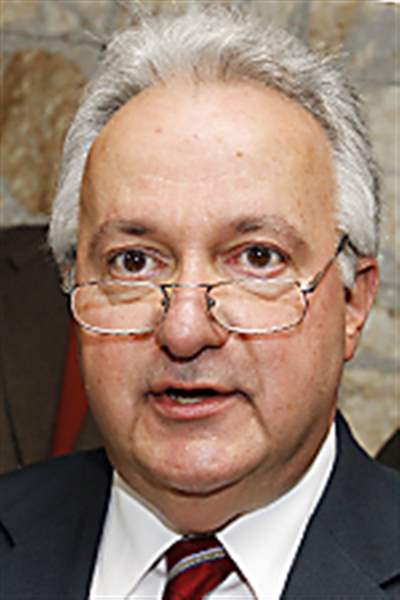
Toledo sees rise in income tax collection
8/1/2014
George Sarantou said the rise in the city’s income tax collections is a positive sign for its ecomomy.
THE BLADE
Buy This Image

George Sarantou said the rise in the city’s income tax collections is a positive sign for its ecomomy.
Income tax collections for the city of Toledo through June 30 are up almost 4 percent from collections in 2013, according to the city’s finance director.
At the end of the second quarter, the city had collected $71.545 million, Finance Director George Sarantou said Thursday at a city council meeting.
Mr. Sarantou said the 4 percent increase indicated a positive trend as people are making more money and the economy is getting healthier.
“Things are getting a little bit better in our tax collections, and our economy is improving,” he said.
City finance department officials project that Toledo will collect a total of $165 million in income taxes this year, while David Black and Oleg Smirnov — two University of Toledo economics professors hired by the city — believe the number will be $164.148 million. Either option would be better than 2013, when the city collected $158.7 million.
However, unemployment in the city of Toledo increased to 6.8 percent in June, up from 6.2 percent in May, according to the Ohio Bureau of Labor Market Information.
Lucas County’s June unemployment was 6.2 percent and Ohio’s was 5.9 percent, below the national rate of 6.1 percent. All unemployment numbers are down from this time last year as the economy slowly improves.
Police overtime pay is running ahead of where it should be for this point in the year. The city budget included $2.3 million for police overtime for the year, and the department had spent $1.4 million by the end of the second quarter, $275,000 more than it should have to stay on budget.
Mr. Sarantou said the finance department was working with police to reduce unnecessary overtime. Forty-two percent of police overtime is the result of officers being called to court to testify, but many cases are decided through settlements, which don’t require witnesses to testify, making the police presence unnecessary.
There is already a system in place through which officers are called to court only when they need to testify, but Mr. Sarantou said they are “trying to work on that becoming more efficient.”
In other business, council discussed an ordinance that would raise the pay ranges for the city’s classified exempt and executive exempt employees, which Mayor D. Michael Collins’ administration has touted as necessary for the city to be competitive with the private sector in hiring new employees, as private sector pay has risen more quickly than city pay.
The ordinance also would eliminate the city’s contribution toward employee pensions, instead giving them a raise while still saving the city money overall.
Council members were interested in the ordinance, but raised concerns about pay equity within departments and said raises should be tied to merit-based performance reviews.
“We need to have a system of career development, and that includes outcome-based performance reviews,” council member Sandy Spang said.
A final version of the ordinance is expected to be presented at the full council meeting on Aug. 12.
Contact Stephen Gruber-Miller at: smiller@theblade.com, 419-724-6050, or on Twitter @sgrubermiller.